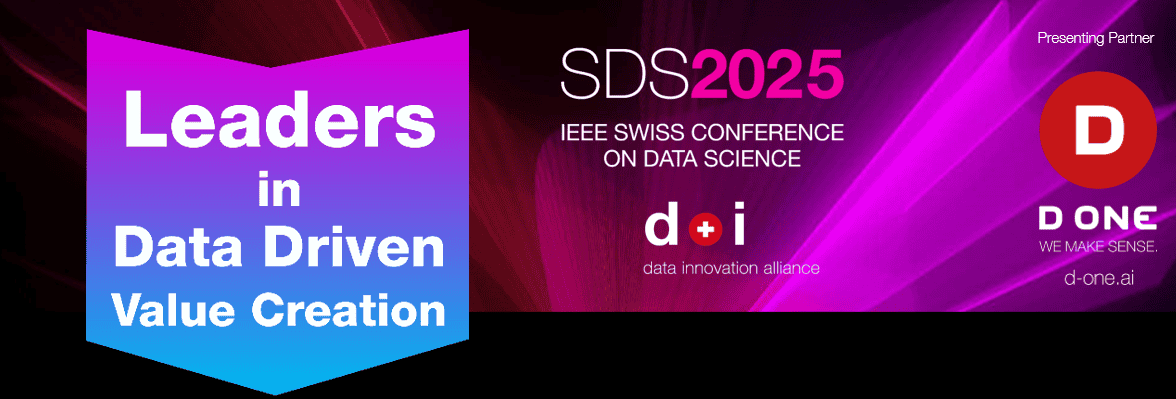
Ruxandra Privighitorita, KSB, Kantonsspital Baden
Head Applications, Data&AI Center of Excellence
Leveraging Data and AI for Advanced Healthcare Strategies and Medical Innovation
In the realm of global healthcare, Kantonsspital Baden is pioneering the use of data and artificial intelligence (AI) to revolutionize patient care and hospital operations. By harnessing the power of advanced analytics and AI-driven tools, the hospital seeks to optimize workflows, reduce costs, and offer tailored treatments to patients. However, the path to becoming a data-driven institution is fraught with challenges. These include establishing strong data governance frameworks, ensuring high data quality and seamless system interoperability, safeguarding patient privacy, adhering to regulatory standards, and overcoming resistance to change within the organization. Furthermore, empowering staff with new skills and fostering a culture centered around data are vital for maximizing the potential of AI and analytics. In an upcoming session, Ruxandra will explore how Kantonsspital Baden is addressing these obstacles and striving towards a future where data plays a central role in healthcare delivery.
Daniel Habermehl, Valora Group
Head of Data Ecosystem & Analytics
Fostering Collaboration in Data Initiatives to
drive innovation
Data & Analytics is a team sport – within D&A teams but also with the business. At Valora, driven by local entrepreneurship and strong brands, building a central D&A unit meant embracing an operating model with co-creation at the center. As part of the FEMSA universe, we navigate added complexity while unlocking rich collaboration opportunities. In this session, we’ll share how a partnership-driven approach has enabled us to align D&A with business needs, accelerate innovation, and embed data-driven decision-making across the organization.
Catherine Kosten, Homburger AG
Head of AI and Legal Tech Innovation
AI Strategy in the Legal Sector: Practical Insights for
a Changing Industry
AI is reshaping the legal industry—enhancing how law firms operate, make decisions, and deliver value to clients. But unlocking its full potential requires more than simply adopting the latest tools. It demands a strategic approach: aligning use cases with real business needs, building scalable implementation frameworks, and putting in place governance models that address both legal and technical risks.
This transformation is also changing the shape of talent within law firms. As law firms move deeper into the world of AI, new roles, skill sets, and interdisciplinary collaborations are emerging. Technologists are becoming key partners in legal innovation—working alongside lawyers to design, implement, and scale intelligent systems. In this talk, we’ll explore how these shifts are redefining legal practice, and why the future of law will be shaped by the fusion of legal and technical minds.
Stephan Willi, Denner AG
Head of Data Analytics & Business Intelligence
Denner’s Journey to a Data-Driven Future
As part of Denner’s strategic digital transformation, we are working on the comprehensive modernization of our core systems and business processes. A cornerstone of this strategic initiative is the development of a next-generation data platform—an ambitious but vital step toward positioning Denner as a truly data-driven discounter. This platform establishes the foundation for scalable and sustainable Business Intelligence and unlocks high-impact advanced analytics capabilities and value cases.
Jonas Stehli, Bank Julius Bär
Head Quantitative Analytics Pricing & Revenue Development
Cutting Through the Hype: Why the Basics Still Matter in Data and AI
In a landscape dominated by new tools, platforms, and inflated expectations around AI, it is easy to lose sight of what actually delivers results. Drawing from experience across consulting and financial services, this talk outlines what consistently works in practice — and what doesn’t — when solving real business problems with data. It focuses on where value is truly created: not in tooling choices, but in the implementation of clear, testable business logic. Fundamentals like reproducibility, reliability, and clarity of terminology remain essential to creating lasting impact — and getting them right is often more about discipline than complexity.
Matthias Mazenauer, Kanton Zurich
Head of Data, Co-Amtschef Statistisches Amt, Präsident KORSTAT
Data is a Team Sport: Creating Value in the Public Administration
Public administration is known for its reliability, less so for innovation and speed. How does the Canton of Zurich, with its 30,000 employees, manage to navigate the rapidly changing environment of AI? Matthias Mazenauer explores this question using concrete application examples and demonstrates how the potential of data and data capacities can be used to modernize administration.
Hadi Karam, Lime Micromobility,
Regional Director – EU West & Middle East
Creating Value from Micromobility Data for Cities and Users
This session will explore how real time micromobility data acts as both the engine for rapid innovation and the connective tissue between business objectives, city needs, and community expectations. By leveraging extensive data streams to inform decision-making and resolve creative tensions, operators can quickly adapt to diverse urban environments, scale effectively, and deliver solutions that benefit users, non-users, and cities alike, demonstrating the transformative potential of data as the foundation for fact-based, collaborative urban mobility.
Anaig Maréchal, Axpo,
AI Lead
Building a Generative AI Center of Excellence: Lessons from the Energy Industry
How can organizations unlock the potential of Generative AI while creating sustainable business value? Over the past year, Axpo, Switzerland’s largest renewable energy producer, has established a Generative AI Competency Center to embed GenAI into the energy sector. This session will share valuable insights from this journey, including strategies for building cross-functional teams, prioritizing high-impact projects, driving cultural change, and implementing governance frameworks that balance innovation with responsibility.








